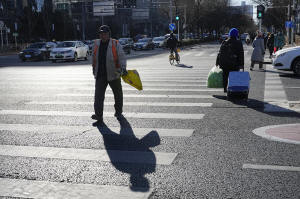Here are some of China's New Year resolutions to boost its economy
 Send a link to a friend
Send a link to a friend
 [January 08, 2025] By
ELAINE KURTENBACH [January 08, 2025] By
ELAINE KURTENBACH
BANGKOK (AP) — China’s leaders are bracing for shocks to the economy
from higher tariffs threatened by U.S. President-elect Donald Trump once
he takes office.
To help rev up an economy bogged down by a property crisis and
disruptions during the pandemic, the ruling Communist Party is rolling
out a slew of measures to get Chinese consumers and businesses to spend
more money and counter a slump in the Chinese currency and stock prices.
Here are some of the top items on China’s list of priorities for 2025:
Subsidies for spending
China plans to expand its cash for clunkers and appliance recycling
programs to encourage more purchases of new, energy-efficient models.
The recycling that began last year has led to the replacement of 6.5
million fuel-powered vehicles with electrics and hybrids since June,
officials of China's main planning agency said Wednesday. They also
cited a double-digit growth in the past several months in sales of new
appliances.
Subsidies of up to 20% of sales prices will now apply to a dozen types
of appliances and also include digital products such as mobile phones,
they said. The government is also subsidizing the upgrading of outdated
factory equipment.

Crackdown on shakedowns
Local officials have been warned not to conduct unjustified “arbitrary
inspections” that interfere with normal business, Hu Weilie, a vice
minister of Justice, told reporters Tuesday according to state media
reports.
The official Xinhua News Agency said new rules are meant to prevent
abuse of power, arbitrary seizures of assets and unjustified orders to
halt production. The effort is part of a campaign aimed at improving
China's business environment, according to Premier Li Qiang. The moves
follow complaints that dozens of executives have been detained or assets
seized by cash-strapped local governments trying to shake down
companies.
More money is on the way
So far, China has not unleashed a big bazooka of stimulus spending,
choosing a more targeted and incremental approach. However, Zhao Chenxin,
head of the National Development and Reform Commission, China's main
planning agency, said the government plans to announce “significantly
larger” scale long-term treasury bonds to finance such spending. But
specific figures won't come until the annual meeting of the national
rubber-stamp legislature, due to be held in early March.
[to top of second column] |

A man crosses a street on Wednesday, Jan. 8, 2025, in Beijing,
China. (AP Photo/Aaron Favila)
 Protecting the ‘people’s money'
China’s central bank said it resolved at a meeting over the weekend
to keep the value of the yuan steady and stabilize financial
markets.
The Chinese currency, also called the renminbi, or
“people's money,” has weakened against the U.S. dollar and other
currencies, putting pressure on its financial markets. Its stock
market has languished again after a brief revival in late September,
when the Shanghai Composite index jumped to nearly 3,700, falling
back to just over 3,200. The yuan was trading at 7.3278 to the
dollar on Wednesday. It was trading near 7 yuan to the dollar in
early October.
A weaker yuan can make Chinese exports more competitive but also
risks angering Chinese trade partners.
Talking up the economy
China's ruling party allows very little leeway for public dissent,
and even the scope for talking about the economy has narrowed.
Authorities have shut down the social media sites of economists
challenging policies as they try to rally support for President Xi
Jinping's leadership. A recent report by Xinhua called for ensuring
“correct public opinions” that are aligned with creating “a
mainstream public opinion of unity and progress.”
But talking up the economy can obscure hard realities, said a recent
report by the think tank Rhodium Group, which estimated China’s
actual economic growth last year at 2.4% to 2.8%, well below the
official estimate of about 5%.
One big factor behind the lower-than-hoped-for growth is pocketbook
issues that crimp demand, such as falling housing prices and smaller
paychecks. The report also said: “No substantial policy measures
have been announced that will substantially change the employment or
wage outlook."
All contents © copyright 2024 Associated Press. All rights reserved
 |